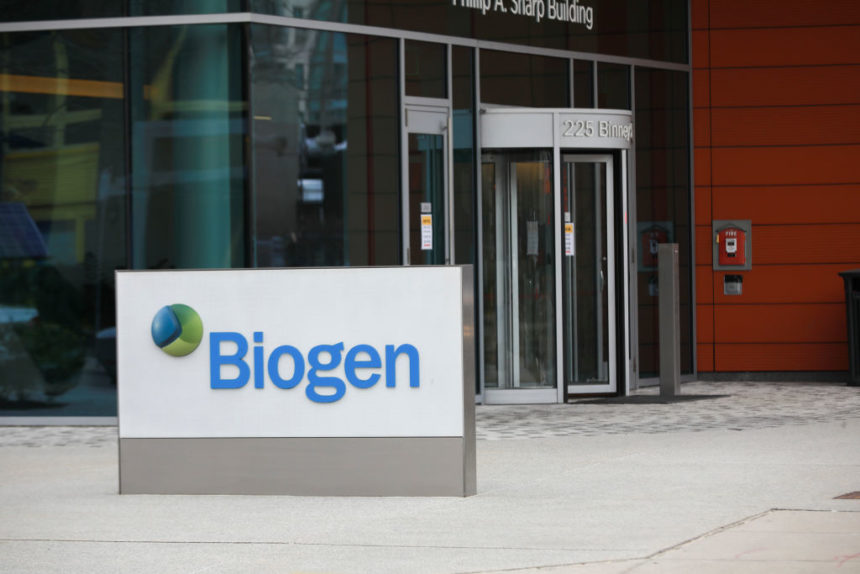Many biotech investors are hoping for a potential rebound in mergers and acquisitions in 2022, after a slowdown in M&A activity left them licking their wounds this past year. A more-than-$40 billion deal, reportedly in the works as 2021 drew to a close, appeared to bolster that optimistic outlook.
Or so it seemed when Korea Economic Daily published an article Wednesday claiming that Samsung Group is considering buying Biogen. According to the piece, which cited unnamed investment banking sources, Biogen had approached the South Korean conglomerate to buy its shares and the two were “at the negotiation table” for a would-be $42 billion deal.
Samsung, however, threw cold water on the Korean media outlet’s report, calling it “groundless” and referring reporters to a regulatory filing from its contract development and manufacturing unit, Samsung Biologics, describing the news as “not true.”
Biogen, for its part, was quoted as saying it does not comment on market rumors or speculation.
Here’s what else we know so far:
The two companies have some existing ties.
The Seoul conglomerate and Cambridge drugmaker have some history together. Samsung Biologics has an existing joint venture with Biogen on biosimilars, called Samsung Bioepis, for which Samsung is primarily the manufacturer. The collaboration dates back to 2011, with five biosimilars having been approved in the US market.
Biogen owns a 50% stake minus one share in Samsung Bioepis, with Samsung Biologics controlling the remaining stake.
If completed, the deal would be the largest of 2021.
The potential deal’s value represented about a 20% premium from Biogen’s current market cap of almost $38 billion. A deal would top the $34 billion Medline Industries transaction, now the second-biggest acquisition of 2021, according to Bloomberg.
There’s some ‘credence’ to the idea.
It’s hard to know whether the rumor has merit, given that Samsung’s intent is in question. That said, the Korean media outlet’s article cites several investment banking sources, albeit anonymously. And certain details in the piece lend “at least some credence to the idea,” wrote Wolfe Research’s Tim Anderson in an investor note.
In September, for instance, the parent company unveiled “ambitious spending plans” including investing $206 billion over the next three years in its core businesses, such as semiconductors, displays and biopharmaceuticals.
Then again, a deal isn’t easy for either side.
The uncertain fate of Biogen’s Alzheimer’s franchise makes the deal “very difficult to value,” Jefferies analyst Michael Yee pointed out in an investor note.
The drugmaker has struggled mightily with the launch of Alzheimer’s drug Aduhelm. Biogen gained approval for the medicine in June over the objections of physicians, scientists and some of the US Food and Drug Administration’s own reviewers. Since then, insurers and academic medical centers have largely resisted covering or prescribing the drug. And its third-quarter sales amounted to just $300,000.
Earlier this month the biotech company said that it would halve the price of Aduhelm to a projected yearly maintenance dose of $28,200 (down from $56,000 a year). The move came just ahead of a Medicare coverage decision for the entire class of amyloid-beta monoclonal antibodies, a decision which Biogen said was a factor in its price cut.
Neither Aduhelm’s launch trajectory nor its standing with the medical community can suddenly be turned around with a price reduction, even assuming broad Medicare coverage, Danielle Brill, an analyst with Raymond James, wrote at the time.
And Aduhelm’s fate may already be sealed, anyway.
Biogen and Eisai are partnering on another Alzheimer’s drug, lecanemab/BAN2401, with Phase III data due to read out next fall. Yee noted that he’s forecasting different payouts for whether Aduhelm ultimately hits sales milestones depending on the upcoming Medicare decision, or if BAN2401 works.
But lecanemab would have a hard time competing since its current twice-a-month dosing is less convenient than rival intravenous drugs, such as Eli Lilly’s donanemab, which is dosed monthly, and Roche’s gantenerumab, which will be administered subcutaneously at home.
Given their view that prescribers will likely prefer these other, still-experimental Alzheimer’s drugs, analysts don’t expect Aduhelm adoption will drastically accelerate.
Biogen’s issues go beyond Aduhelm.
The rest of the biotech’s business is a “melting ice cube,” Anderson noted. For one, last year’s patent expiry of its best-seller, multiple sclerosis drug Tecfidera, was blamed for weaker third-quarter sales.







